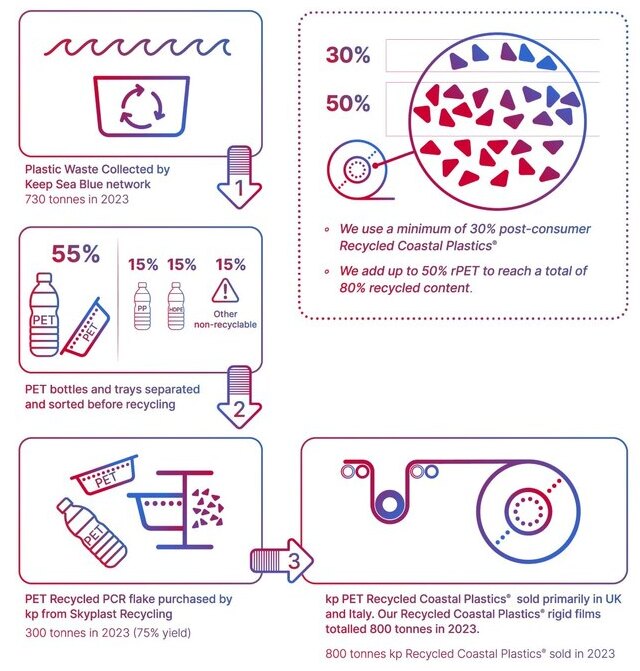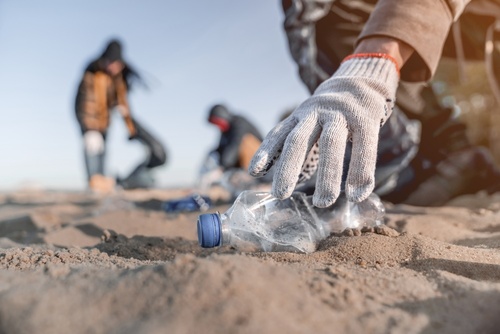We believe that every business should be pulling out all the stops when it comes to sustainability and creating a more environmentally responsible packaging industry. This includes not only material challenges, but also educating consumers on matters of recyclability. ", "categories":["Sustainability##Sustainability",""], "filters":["projects##projets","recycling##recyclage","post-consumer PET##PET post-consommation","rPET##rPET","partnerships##partenariats","ocean-bound plastic##le plastique de l'océan","collaboration##collaboration",""]}
Turning the tide on marine waste: Eight hundred tonnes of Recycled Coastal Plastics®
Our oceans, beaches and waterways are some of the most beautiful parts of the world, but they’re also some of the most at risk from plastic waste.
We believe that every business should be pulling out all the stops when it comes to sustainability and creating a more environmentally responsible packaging industry. This includes not only material challenges, but also educating consumers on matters of recyclability.
At Klöckner Pentaplast (kp), we are celebrating an important landmark in our sustainability journey. In 2023, in collaboration with Keep Sea Blue, an environmental organisation operating through the Mediterranean region, we produced eight hundred tonnes of PET packaging, incorporating 400 tonnes of PET bottles and trays collected within 10km of coastlines, into new food packaging solutions.
At Klöckner Pentaplast (kp), we are celebrating an important landmark in our sustainability journey. In 2023, in collaboration with Keep Sea Blue, an environmental organisation operating through the Mediterranean region, we produced eight hundred tonnes of PET packaging, incorporating 400 tonnes of PET bottles and trays collected within 10km of coastlines, into new food packaging solutions.
Share this story

The challenge of marine plastic waste:
Marine plastic pollution has become a global crisis, with over 14 million tonnes of plastic entering oceans and waterways annually.
Plastics are vital in many different ways, but when not recovered effectively, this issue poses a threat to marine ecosystems, while also impacting coastal tourism.
From a packaging perspective, the challenge is twofold: creating more effective waste recovery schemes that close the loop in plastics, and making it clearer to consumers where packaging can be recycled rather than left to landfill. The ubiquity of plastic pollution demands urgent action - and kp is proud to play its part.
Plastics are vital in many different ways, but when not recovered effectively, this issue poses a threat to marine ecosystems, while also impacting coastal tourism.
From a packaging perspective, the challenge is twofold: creating more effective waste recovery schemes that close the loop in plastics, and making it clearer to consumers where packaging can be recycled rather than left to landfill. The ubiquity of plastic pollution demands urgent action - and kp is proud to play its part.
kp's Recycled Coastal Plastics®
Aligning with our vision of a more ecologically sound packaging industry, we have embarked on an important journey with Keep Sea Blue.
Keep Sea Blue is an organisation dedicated to combating marine pollution. The organisation coordinates the collection of plastic waste from at-risk coastal areas, predominantly across the Greek islands and Cyprus. The plastic waste is then sorted and recycled by an accredited and certified recycler, before it is processed into Recycled Coastal Plastics® by kp.
Advancing the field of plastic collection, Keep Sea Blue uses a closely monitored network across the Greek islands in the Mediterranean Sea. What sets this initiative apart is its transparency—every detail of the plastic's identity and journey is captured on a Blockchain traceability platform, powered by Oracle technology. This ensures absolute transparency in material provenance, a key requirement of supply chains in the food packaging industry.
We conduct rigorous quality checks, verifying the origin, date, and location of plastic collection. Approximately 55% of the collected plastic waste comprises PET bottles and trays which are processed, recycled, and reused. The remaining 45%, mainly PP or HDPE, is responsibly recycled in different waste streams. These recycling processes adhere to BRC, ISO 9001, TUV, and RecyClass certifications.
Keep Sea Blue is an organisation dedicated to combating marine pollution. The organisation coordinates the collection of plastic waste from at-risk coastal areas, predominantly across the Greek islands and Cyprus. The plastic waste is then sorted and recycled by an accredited and certified recycler, before it is processed into Recycled Coastal Plastics® by kp.
Advancing the field of plastic collection, Keep Sea Blue uses a closely monitored network across the Greek islands in the Mediterranean Sea. What sets this initiative apart is its transparency—every detail of the plastic's identity and journey is captured on a Blockchain traceability platform, powered by Oracle technology. This ensures absolute transparency in material provenance, a key requirement of supply chains in the food packaging industry.
We conduct rigorous quality checks, verifying the origin, date, and location of plastic collection. Approximately 55% of the collected plastic waste comprises PET bottles and trays which are processed, recycled, and reused. The remaining 45%, mainly PP or HDPE, is responsibly recycled in different waste streams. These recycling processes adhere to BRC, ISO 9001, TUV, and RecyClass certifications.
The recycled material is utilised in the production of food packaging at multiple kp production sites across Europe, supplying customers in Germany, Italy, Portugal, Turkey, and the UK.
Local change, global impact
The success of kp’s Recycled Coastal Plastics® use is not confined to local shores. The recycled material is utilised in the production of food packaging at multiple kp production sites across Europe, supplying customers in Germany, Italy, Portugal, Turkey, and the UK. This widespread implementation demonstrates kp's commitment to providing sustainable packaging solutions on a global scale, and perfectly matches our “Packaging with integrity” ethos and our “Investing in Better” strategy.
To amplify awareness and boost consumer clarity, we have introduced a dedicated logo for packaging that is made using Recycled Coastal Plastics®. This logo empowers consumers to make informed choices, actively contributing to the protection of marine environments and the promotion of a more sustainably orientated future.
To amplify awareness and boost consumer clarity, we have introduced a dedicated logo for packaging that is made using Recycled Coastal Plastics®. This logo empowers consumers to make informed choices, actively contributing to the protection of marine environments and the promotion of a more sustainably orientated future.
Shoring up the food packaging industry

Through initiatives that optimise resources and reduce overall reliance on virgin materials, we believe that the food packaging industry can be strengthened for the long term. In addition to reducing the risk of plastic waste leaking into rivers, oceans and beaches, we believe that supporting the collection of coastal plastics puts more rPET feedstock back into the plastic economy on our journey to full circularity.
We aim to make waves in the food packaging industry, and contribute to cleaner oceans and beaches – will you join us?
More like this







